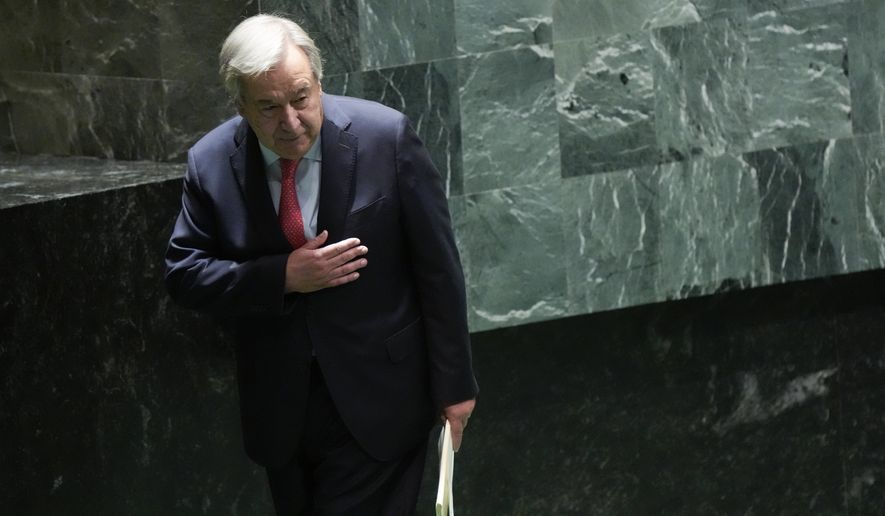NEW YORK — World leaders should quickly consider creating a global organization akin to the International Atomic Energy Agency to address both the benefits and the dangers of artificial intelligence — specifically, those associated with the fast-emerging realm of “generative A.I.” capable of creating text, images and videos.
That was a key message that U.N. Secretary-General Antonio Guterres offered in his opening remarks to the annual U.N. General Assembly gathering that got underway in Manhattan on Tuesday morning.
“When I mentioned artificial intelligence in my General Assembly speech in 2017, only two other leaders even uttered the term. Now A.I. is on everyone’s lips — a subject of both awe and fear,” said Mr. Guterres, who told world leaders that “generative A.I. holds much promise, but it may also lead us across a Rubicon into more danger than we can control.”
“Even some of those who developed generative A.I. are calling for greater regulation,” he said. “But many of the dangers of digital technology are not looming on the horizon. They are here.”
The expanding use and proliferation over recent months of such generative A.I. uses as those involving ChatGPT, which churns out human-like responses to user prompts on phones and computers, has sparked growing debate about the uses and abuses of the new technology around the world.
In the United States, for instance, artificial intelligence in general has been at the forefront of ongoing labor fights in Hollywood. The Associated Press has noted that as the technology to create without creators emerges, star actors fear they will lose their control of their lucrative likenesses, while unknown actors fear they’ll be replaced altogether and writers fear they’ll have to share credit or lose credit to script-writing machines.
Mr. Guterres pointed to potentially more grave dangers associated with the largely unregulated emergence of A.I., asserting that “the digital divide” already is “inflaming inequalities.”
“Hate speech and conspiracy theories on social media platforms are spread and amplified by A.I., undermining democracy and fueling violence and conflict in real life,” the U.N. secretary-general said. “Online surveillance and data harvesting are enabling human rights abuses on a mass scale and technology companies and governments are far from finding solutions.”
“We must move fast,” he said. “New technologies require new innovative forms of governance, with input from experts building this technology and from those monitoring its abuses.”
“We urgently need a global digital compact within governments, regional organizations, the private sector and civil society to mitigate the risks of digital technologies and identify ways to harness their benefits for the good of humanity,” Mr. Guterres said.
He added that there are a variety of potential models for an international body to advance the initiative.
“There are many different models inspired by such examples of the International Atomic Energy Agency, International Civil Aviation Organization, or the Intergovernmental Panel on Climate Change,” Mr. Guterres said, adding that he will appoint a U.N.-backed “advisory body on artificial intelligence” in the coming weeks.
The advisory body will provide recommendations by the end of 2023, he said, suggesting that a more formal international organization on A.I. could emerge at the U.N.’s “Summit of the Future” in 2024, an event Mr. Guterres described as “a once-in-a-generation opportunity for progress to deal with these new threats.”
• Guy Taylor can be reached at gtaylor@washingtontimes.com.




Please read our comment policy before commenting.